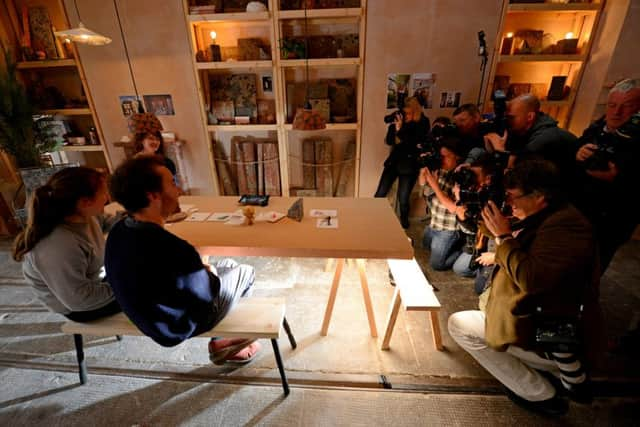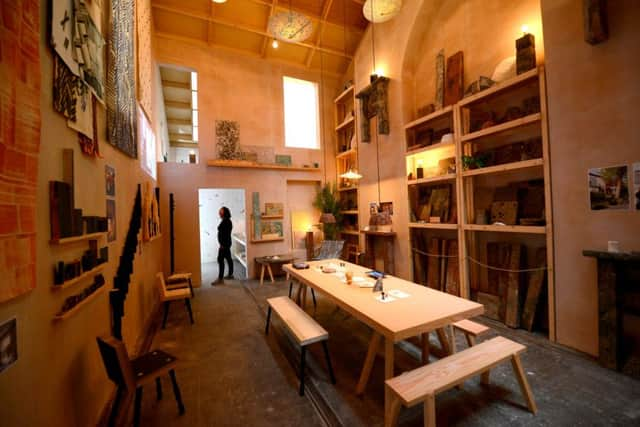Architecture collective Assemble win Turner Prize


The 18-strong group Assemble, the first ever collective to be shortlisted for the Turner Prize, were honoured for a project to breath new life into a cluster of Victorian terraced houses.
The London-based outfit - who created a new adventure playground in the east end of Glasgow for the Commonwealth Games - have been using low-cost materials and demolition waste to revitalise previously derelict-properties in Toxteth.
Advertisement
Hide AdAdvertisement
Hide AdThe Turner Prize win is also a remarkable turn-around also for the “Granby Four Streets” campaign residents - who were staging a party in the estate tonight - following a 20-year battle to prevent their homes from being demolished.


Assemble’s contribution for the Turner Prize nominees show, which has been running at the Tramway in Glasgow for the last two months, saw them recreate their workshop from the Granby Four Streets for the Pollokshields arts centre.
Their Tramway showroom featured hundreds of examples of household goods which have been created for the 10 new-look homes Assemble has worked on in Toxteth, including tiles, fireplaces, doorknobs, furniture and lamps.
Alice Edgerley, one of the jubilant architects in the collective, said: “It is amazing, we really couldn’t believe it when we heard we had won.
“We were all really surprised when we were nominated in the first place.
“It’s fantastic for this to happen as hopefully it will mean that there will be continued support for the project in Liverpool.
“We’ve already done a feasibility study for the wider area and have set up a new social enterprise, making a lot of the products for refurbishments, as a result of the nomination. We just hope it can continue for as long as possible.”
The Turner Prize judges said Assemble’s work offered “alternative models on how societies can work.”
Advertisement
Hide AdAdvertisement
Hide AdThey added: “The long-term collaboration between Granby Four Streets and Assemble shows the importance of artistic practice being able to drive and shape urgent issues in the post-industrial era.”
In her review for The Scotsman, art critic Moira Jeffrey said Assemble’s nomination for the Turner Prize had raised questions about whether the collective should be considered artists.
But she said of their Glasgow showcase: “Theirs is a lovely hands-on installation, all warm wood and plaster. This reconstruction of a Toxteth terrace house reaching far in to Tramway’s lofty space is a delightful touch.”
The other nominees for this year’s Turner Prize had included an operatic work originally commissioned for a performance in Glasgow’s historic Mitchell Library.
Canadian artist Janice Kerbel’s musical suite - consisting of nine different tales for six voices, and performed at various times during the exhibition’s run - was inspired by her fictional character Doug and his daily apocalyptic experiences.
German artist Nicole Wermers’ transformed 10 classic Cesca chairs by covering them in vintage furs to explore themes of lifestyle, class, consumption and control.
Visitors to London artist Bonnie Camplin’s study room can watch a series of pre-recorded interviews with people outlining various conspiracy theories, as well as flick through textbooks on subjects as varied as fairies and witchcraft, to capitalism and warfare.
The award, which now in its 31rd year, has helped some of Britain’s biggest visual artists - including Damien Hirst, Antony Gormley, Anish Kapoor and Tracey Emin - make their breakthroughs.
Advertisement
Hide AdAdvertisement
Hide AdGlasgow, which has had a host of Turner Prize contenders and winners over the last two decades, was hosting the awards show for the first time under organiser Tate Britain’s policy of taking it on the road every other year.
Ironically, Scottish artists missed out completely on the shortlist for this year’s prize, despite an incredible run of nominees in recent years, with all four of the 2015 nominees based in London.
This time last year three Glasgow School of Art graduates – Duncan Campbell, Ciara Phillips and Tris Vonna-Michell – all made the shortlist, with Dublin-born Campbell going on to win the £25,000 prize.
Before 2014, the city had boasted six previous winners - Martin Creed, Susan Philipsz, Douglas Gordon, Simon Starling, Richard Wright and Martin Boyce - with the latter four all studying at GSA.